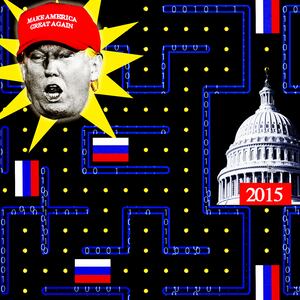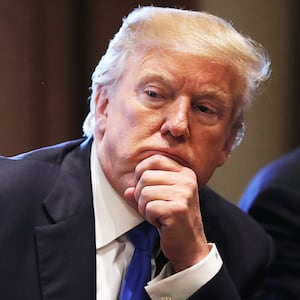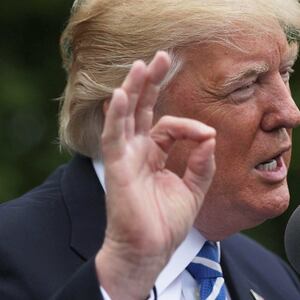Two teams of federal officials assembled to fight foreign election interference are being dramatically downsized, according to three current and former Department of Homeland Security officials. And now, those sources say they fear the department won’t prepare adequately for election threats in 2020.
“The clear assessment from the intelligence community is that 2020 is going to be the perfect storm,” said a DHS official familiar with the teams. “We know Russia is going to be engaged. Other state actors have seen the success of Russia and realize the value of disinformation operations. So it’s very curious why the task forces were demoted in the bureaucracy and the leadership has not committed resources to prepare for the 2020 election.”
The task forces, part of the Cyber Security and Infrastructure Agency (CISA), were assembled in response to Russian meddling in the 2016 presidential election. One focuses in part on securing election infrastructure and the other focuses on foreign influence efforts, including social media disinformation campaigns.
One of the task forces is now half the size it was a few months ago, according to two DHS officials familiar with the task forces, and there’s no indication that DHS senior political leadership will staff it up or sustain it. Instead, there are concerns it will completely wither away. The other task force also shrank significantly shortly after the midterms, according to that official, and before its members produced a thorough assessment of what happened during the 2018 elections.
“Our key allies are wondering why the U.S. is not more coordinated and not more proactive in dealing with this,” said the DHS official. “They don’t understand why the U.S. is not getting its act together.”
A DHS spokesperson confirmed that some people have been taken off the task forces and moved to other roles in the department. The spokesperson added that the department is bringing on new people to do election security work.
“As recently as this morning, Director Krebs confirmed election security remains a priority for CISA in his testimony before the House Committee on Homeland Security, laying out the Agency’s plan to work with State and local election officials on broader engagement, better defining risk to election systems, and understanding the resources to manage that risk,” said Sara Sendek, the DHS spokesperson.
“In the run up to the 2018 elections, DHS staffed the newly created elections task force and countering foreign influence task force by temporarily assigning personnel from across the Department. The work of these task forces continues to this day and is being institutionalized as a permanent effort. While some of the personnel who were brought on to serve on these task forces in temporary assignments have returned to their regular roles, we are also currently hiring new employees into permanent election positions to build out our team and support our efforts for 2020 and beyond,” Sendek added.
One lawmaker with knowledge of the formation of CISA said the task forces were never intended to be permanent.
“In some sense it’s not surprising that these changes are happening,” he said. “There was nothing set in stone that said these teams were going to stay in formation. At least that was my understanding.”
Others said they found the change concerning.
“The Trump administration intelligence chiefs in their worldwide threat assessment clearly stated that the use of influence operations from countries like Russia, China and Iran poses a significant threat to the country,” said John Cohen, the former deputy undersecretary for intelligence and analysis at DHS. “If these reports are true, it’s highly disturbing that the department and the administration are not more focused on dealing with that threat.”
The election task force has worked to shield election infrastructure from foreign efforts to change vote counts. And the foreign influence task force is working to publicly reveal efforts by foreign actors to shape American political discourse on social media—in the hopes of significantly expanding Americans’ understanding of the threat. It was also designed to improve DHS’s coordination with foreign allies who face the same threat, and to help DHS better alert the private sector about threats.
The changes to the task forces may make it harder for them to realize those goals, current and former officials say.
“It won’t be 2016 all over again—the threat is changing,” said a former DHS official. “A thinly staffed task force working on that is not going to be equipped to keep up with the adversary.”
A few weeks before President Donald Trump’s inauguration, then-DHS Secretary Jeh Johnson determined that DHS was responsible for helping protect election infrastructure—meaning polling places, voting machines, voter databases, and all the other components that make elections happen. The new, complex undertaking involved scores of state and local governments. A few years in, the department is still getting its footing. So the changes detailed here have people close to the department deeply concerned.
“Because it’s a very difficult task and because DHS has never done it before, there’s a lot of catching up to do,” said the former DHS official. “Even with a fully resourced effort, that would be an extremely tall task. But having it be deprioritized and lacking access to senior leadership, it’s virtually impossible.”
That said, these changes appear to reflect the White House’s lack of interest in beefing up election security, according to Paul Rosenzweig, formerly deputy assistant secretary for policy at DHS.
“If the president isn’t interested and there is no strategy, it’s no surprise that DHS is not wasting its time,” said Rosenzweig, now a senior fellow at the R Street Institute. “The failure of the White House to take this seriously is perhaps its single most significant dereliction of duty.”
The White House press briefing on Aug. 2, 2018 focused on election security, and the Trump administration has sanctioned Russian individuals and entities in retaliation for the 2016 election meddling.
“Since the beginning of his administration, President Trump has implemented a whole-of-government approach to safeguard our nation’s elections,” press secretary Sarah Huckabee Sanders said at the time. “The President has made it clear that his administration will not tolerate foreign interference in our elections from any nation-state or other dangerous actor.”
Before the midterms, both task forces reported directly to Chris Krebs, the Senate-confirmed director of CISA. But after the midterms, that changed. Now, they report to an official who is much lower in the chain of command. The shift could seriously inhibit their effectiveness, according to one of the DHS officials, and suggests their work is not a top priority for DHS political leadership.
Krebs testified on Wednesday before the House Homeland Security Committee. The hearing focused on election security infrastructure and partnerships between DHS and state election officials.
Congressional staff reached out to CISA about the task forces before Krebs’ hearing as part of their preparation, according to a person with knowledge of the committee's work.
But Krebs did not directly address the reorganization or the shrinking of the CISA task forces. Instead, he said his team needed to do more to secure the upcoming 2020 elections.
“While 2018 is behind us, the 2020 election season is already underway. We are clear-eyed that the threat to our democratic institutions remains and we must continue to press for increased security,” he said. “Just like any other IT system, the election infrastructure bears additional securing and resilience measures.”
Later in the hearing, Krebs said American voters need to be more sophisticated about disinformation campaigns.
“We have to do more awareness building in this country as we’re just deluged with information,” he said. “We got to have people thinking, ‘Where is this information coming from? And why is it coming to me?’”
Inside DHS, staffers are frustrated that emphasis on election security has dwindled as the focus on border security has exploded. One staffer told The Daily Beast that officials working on election security have discussed ways to get the message to the White House, but found no one willing to bring it up directly with Trump.
“It’s very clear which direction we’re headed in DHS,” one staffer told The Daily Beast. “Everything, it seems, is dictated by someone higher up the chain who is making it abundantly clear to the rest of us that immigration and border security are the real focuses.”
A member of the DHS Advisory Council, a group of individuals in the public and private sectors that provide the secretary with guidance on DHS policy, echoed those concerns. The member told The Daily Beast that the calls with Sec. Kirstjen Nielsen over the past six months have focused on the migrant caravan and the need for increased border security.
“Increasingly, the administration’s own information seems to undercut their argument that conditions at the southern border represent a national security crisis,” Cohen said. “So, it’s unclear why they would focus more resources on the border than dealing with what the intelligence committee has identified as a sig national security threat.”









